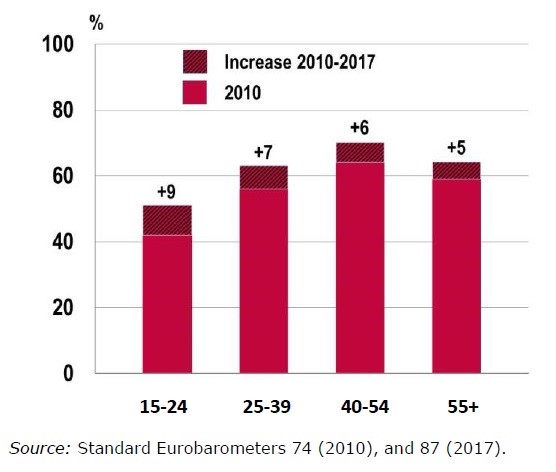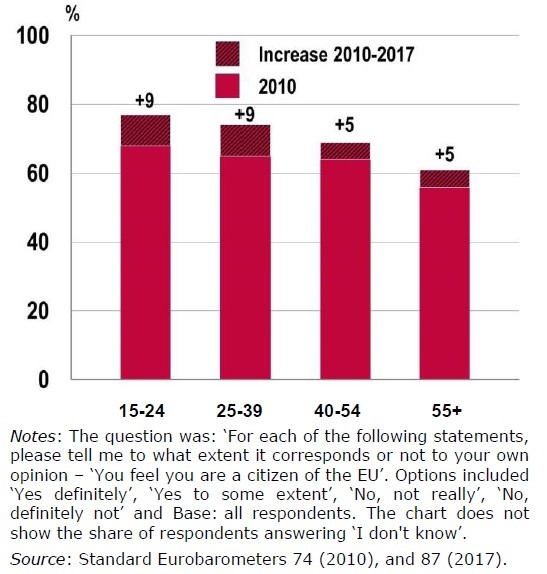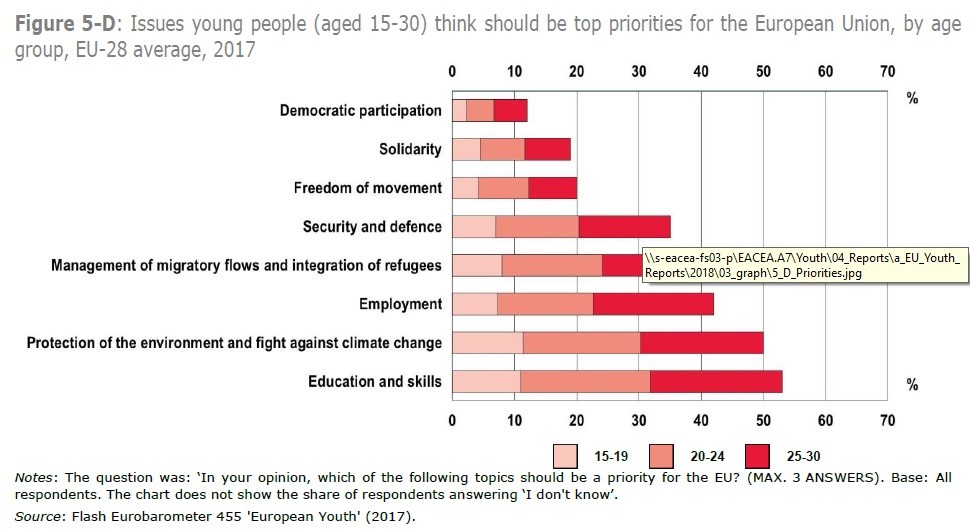Young people’s interest in politics in EU, representative democracy and other ways of participation

Interest in the political life of society is a stepping stone to involvement in community life and vice versa. An interest in politics stimulates an individual to become informed about how the policy-making process works, what the opinions of different stakeholders are, and what means of participation are available. This article makes an overview of the “participation” part of the new EU Youth Strategy 2019-2027 i.e. the European Commission staff working document “Situation of young people in the EU”, part 5/7. It shows how an increasing number of young Europeans are exploring new ways of political engagement and expression through the use of the internet and social media. It shows that while the traditional modes of participation (ex. voting on elections) are decreasing, there is a renewed interest from young people in political issues that is higher than older generations (unlike in the past). This article is making conclusions and observations based on evidence-based research and facts-analysis.
The EU Youth indicators for Participation are as follows:
– Participation of young people in elections at the local, regional, national or EU level;
– Young people elected to the European Parliament;
– Young people’s participation in political organizations/parties, or community-oriented organizations;
– Young people who use the internet for interaction with public authorities;
– Young people using the internet to post opinions on civic and political issues via websites;
- YOUNG PEOPLE’S INTEREST IN POLITICS AND THEIR PERCEPTION OF EU CITIZENSHIP
On average, over half of young Europeans aged between 15 and 24 declared themselves to be moderately or strongly interested in politics in 2016. Levels of interest in political issues by young people in Europe seem to have increased in recent years. It is interesting to compare this with older groups who traditionally have been more politically engaged than young people. But this is changing (figure 1)
Figure 1: Percentage of people with a moderate or strong level of interest in politics, by age group, EU-28, 2010 and 2017

Research has identified the main reason behind this renewed sensitivity to political issues in young people: their increasing use of new media for social and civic communication. Social media such as podcasts, wikis, blogs and online networks are recognized as tools that can greatly facilitate participatory and peer-based politics, allowing individuals and groups to connect and discuss issues of public concern.
Besides a general interest in politics, identification with a political entity and perception of citizenship is crucial in determining the degree of engagement in political life.
It is important to note that more young people feel connected to EU citizenship than the older generations. It is important to stress the fact that self-identification as European citizens has grown more among young people than among older individuals. (figure 2). This might be related to the fact that young Europeans, compared to older age groups, have more opportunities to travel to other European countries, for study, work or tourism. They also have a better knowledge of foreign languages and on average higher levels of formal education – all factors positively related to nurturing a sense of European citizenship

Figure 2: Percentage of people who feel they are a citizen of the EU, by age group, EU-28 average, 2010 and 2017
When it comes to young people’s opinion on the top priorities that the EU should focus, “the education and skills” along with “the protection of the environment” are the top priorities to be addressed at the EU level (figure 5-D). They are followed by “employment” and the “integration of refugees”. On the other hand, “democratic participation” is the issue considered the least important among those highlighted in the survey. Even though more young people identify themselves as European citizens, this does not seem to translate into the opinion that fostering democratic participation should be a priority for the EU. This counterintuitive result seems to be in line with what research has indicated as a predominantly ‘efficiency-driven’ concept of citizenship prevailing amongst the younger generations[1]. According to this notion, young people’s attachment to the EU is born out of the desire to see concrete improvements in their lives (for example, receiving a quality education, living in a healthy environment and finding a job), rather than on the less tangible principle of democracy and its practicalities in terms of citizenship and electoral representation.

All in all, the data described so far reveal young people’s sound interest in politics and their strong European identity. These factors, paired with the low level of priority given to democratic participation, create the basis for understanding the actual forms of civic and political engagement favored by young Europeans.
- YOUNG PEOPLE’S PARTICIPATION IN REPRESENTATIVE DEMOCRACY AND OTHER ALTERNATIVE WAYS
Voting on elections is usually referred to as a relevant measure of citizen’s participation. And electoral turnout amongst young Europeans continues to decline.
Research literature has long since documented a variety of factors combining to influence the voting turnout amongst younger as well as older voters (including the level of educational attainment, family income, and exposure to political conversations and exchanges)[1]. Current research being conducted on the issue of youth voting patterns is pointing towards an additional element: although young people do believe voting to be an important means of participation, they often choose to abstain because they do not think that politicians running at elections nor the issues debated during the campaigns sufficiently address their concerns[2]. Rather than lacking interest in politics, it may be that young people are not attracted by the choices on offer at elections.
Young people seem to be frustrated with the traditional and institutionalized forms of political participation. The virtual space offered by the internet, such as online forums, chat rooms, social networks, and blogs, may serve the same basic function as the physical ones. In this sense, the internet constitutes a great resource for political and social engagement, which young people have been the quickest to recognize and use. Therefore, the internet plays a significant role in facilitating interactions between young citizens and public authorities, and the expression of youth’s political communication.
Data collected by Eurostat show that, on average, 46 % of young Europeans used the internet to contact or interact with public authorities in 2017, and this figure has increased over the last seven years, in particular in Estonia, Greece, and Turkey. In the Scandinavian and Baltic countries, this percentage is extremely high, indicating widespread use of online applications to obtain information from public authorities. On the other hand, young people in some European countries, in particular in Southern and Eastern Europe, seem less familiar with this form of interaction with public authorities. It is to be kept in mind that the propensity to use the internet to interact with public authorities is strongly influenced by the level of digitalization reached in a country (i.e. where public administrations have established online procedures to communicate and interact with citizens, using to the internet is more common amongst younger as well as older individuals).
As a conclusion, young people have shown increasing interest in politics since 2010, and are those who feel the most European in the general population. Yet, electoral turnout continues to decrease amongst young Europeans, especially on the occasion of EU elections. Feeling unrepresented by the options available at elections appears as the most frequent reason reported for not taking part, rather than a lack of interest in democratic participation.
However, new modes of political engagement and communication have attracted young Europeans’ interest. Frustration with traditional and institutionalized forms of political participation has motivated young people to use the internet and its applications (such as social media, podcasts, wikis, blogs and online networks) as a vehicle for expressing their opinions, establishing communities of like-minded citizens and initiate organized actions.
Exercises:
– Describe what you would say to a friend that doesn’t want to vote in elections? She doesn’t believe that voting will change anything and that no one from the candidates does not relate to her personal goals and work. She is saying that she is active enough by posting on social media and she doesn’t need to vote to prove her citizenship or gain anything in return.
Reflection questions




